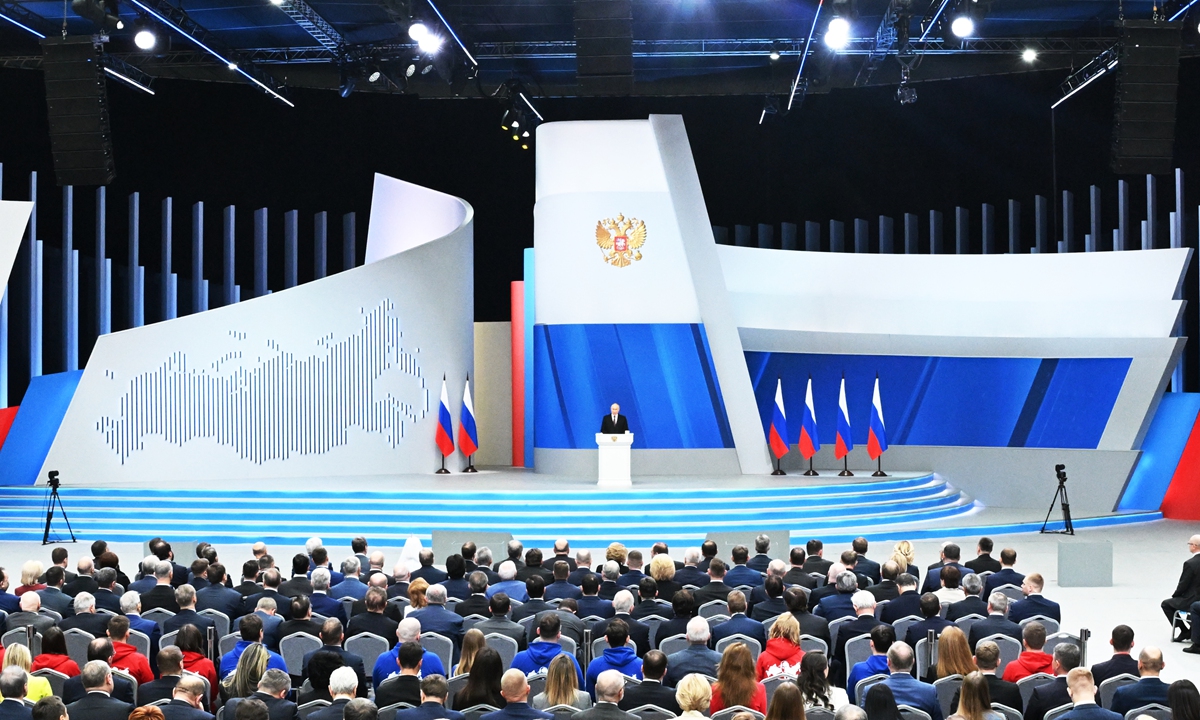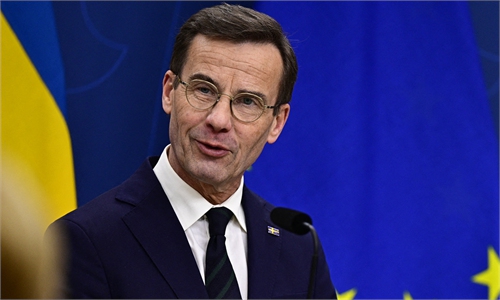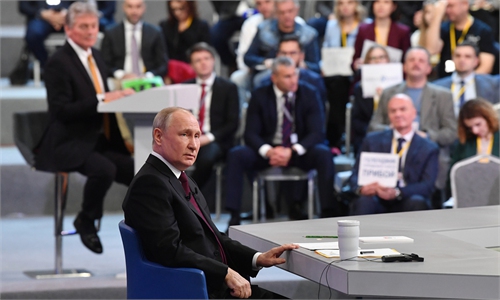Putin 'projects confidence' over war in Ukraine, Russia's economic growth under Western sanctions

Russian President Vladimir Putin delivers his annual State of the Nation Address to the Federal Assembly at Gostiny Dvor in Moscow, Russia, on February 29, 2024. Photo: VCG
Russian President Vladimir Putin delivered his annual State of the Nation Address on Thursday. It was a key occasion for him to project confidence about Russia's development under the pressure from the West and Russia's "special military operation" in Ukraine before the presidential election in March. Commenting on the speech, analysts said Putin is telling the world that Russia is not concerned at all and is even satisfied with the current situation. Moscow is waiting for the US for talks, the analysts said.Chinese analysts said the world must admit that Russia's current economic performance is better than expected. The analysts added that the reasons why Russia has been able to withstand Western sanctions in the past two years are complex, as the most important one is that Russia is a country that has self-reliance on energy and foods, and the conflict in Ukraine has brought a huge demand for its military industry and completely activated its supply chains, and in addition, the Global South didn't join the Western-led sanctions and even some Western countries have been reluctant to completely implement the sanctions.
All of these allowed Putin to send a strong signal of confidence to the Russian people and the world. The US and its Western allies are the ones that are concerned about the current situation, and whether Moscow and Washington can realize talks in the future or continue their struggle in all fronts depends on the result of the US presidential election this year, experts said.
Message of confidence
Putin's speech to the Federal Assembly, a gathering of leading Russian officials and public figures, has covered broad issues, including the conflict with Ukraine, the arms race with the West, Russia's advantages in missiles and nuclear weapons, response to possible appearance of European countries' troops in Ukraine, the possibility of talks with Washington, successful diplomatic ties with non-Western world, and Russia's economic development and other internal affairs.
Putin said that politicians in the West sought to weaken Russia from within, just like they did in Ukraine, but they have failed, TASS reported. "They essentially would like to do to Russia exactly what they did to many other regions of the world, including Ukraine: bring discord to our home and weaken us from within. But they miscalculated," the Russian president said. "It is absolutely obvious today."
On the conflict with Ukraine, Putin said Russia "did not start the war" in Ukraine's Donbas region in 2014, but will do everything to end it and "eradicate Nazism." The Russian army is confidently advancing in a number of directions on the Ukrainian front line, he said.
It's too early to say the current situation of the conflict is in favor of Russia or Ukraine, as victories of some battles haven't completely changed the situation strategically, said a Beijing-based Chinese military expert who asked for anonymity. "But it's pretty clear that the US and Western countries are not satisfied with the situation and they are seeking new approaches to change it."
French President Emmanuel Macron has openly discussed the possibility of sending European troops to Ukraine to help Kiev win the war against Russia, but his NATO allies including the US, Germany and the UK, have recently ruled out such possibility, media reported.
During his speech, Putin warned the West of "tragic consequences" for any country that dares to send troops to Ukraine. "They must realize that we also have weapons that can hit targets on their territory. All this really threatens a conflict with the use of nuclear weapons and the destruction of civilization. Don't they get that?"
Russia is challenging the unipolar system, which is dominated by the US, through its conflict with Ukraine, so Washington will not allow Moscow to succeed, and the US and its allies will still find new measures to fight Russia, and the future of ties between Russia and the West is not optimistic, said Chinese experts.
But the Russian president still expressed that he is open to talks with the US. He said during his address that Moscow is ready for dialogue with the US on "strategic stability" but rejects any attempts to force Russia into talks. He also rejected the possibility of negotiations on strategic stability with the US in isolation from Russian national security issues.
Cui Heng, a scholar from the Shanghai-based China National Institute for SCO International Exchange and Judicial Cooperation, told the Global Times on Thursday that "the strategic stability" means the negotiation for a new deal about nuclear weapons between Russia and the US, as this is a very urgent task to ensure that the two nuclear-armed powers won't engage in a nuclear war, but Putin would like to only talk to the winner of US presidential election.
Economic powerhouse?
On the economy, Putin said Russia's Purchasing Power Parity (PPP) already makes it the biggest economy in Europe in PPP terms, and could join the top four globally. The Russian president noted that in 2023 the Russian economy outpaced the G7 states in terms of growth.
"The pace and quality of growth allow us to say that in the near future we will take a step forward and become one of the four economic powers of the world," Putin said.
Putin also said the BRICS countries are overtaking the G7 in terms of share in global GDP in PPP terms. The share of BRICS will increase to 36.6 percent by 2028, while that of the G7 will decrease to 27.8 percent, according to estimates provided by the Russian president, RT reported on Thursday.
Wang Yiwei, director of the Institute of International Affairs at the Renmin University of China, who's now visiting Russia for research, told the Global Times on Thursday that since the end of the Cold War, "we found that Russia is probably the only country that can survive and even realize development and growth under the all-out sanctions launched by the West."
It's unrealistic to say Russia receives no impact, as its high-end industries like micro-electronics, semiconductors and other fields about innovations are being impacted heavily, and the people in Russia are also being impacted by rising prices caused by Western sanctions, Wang noted. "But in terms of wartime economy, Russia's performance is clearly better than the expectation."
Cui said the Putin's government has a group of sophisticated officials who cautiously adjust currency and prices of commodities, noting that another key reason is that the demand for military products has activated the country's manufacturing industry.
More importantly, Russia has not been completely isolated despite Western sanctions, experts said. The Global South, including major economies like China, India, Arab countries, Latin American, African and ASEAN countries haven't joined the Western-led sanctions, and this is why Moscow now highly values its ties with the non-Western world.



